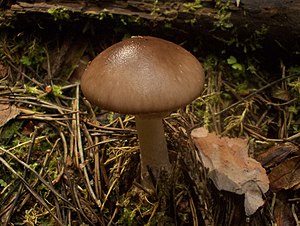Difference between revisions of "Amanita porphyria"
m (1 revision imported: Import Amanita from Wikipedia.) |
|
(No difference)
| |
Latest revision as of 21:36, 8 October 2019
Template:One source Template:Stack begin
| Amanita porphyria | |
|---|---|

| |
| Scientific classification | |
| Kingdom: | |
| Division: | |
| Class: | |
| Subclass: | |
| Order: | |
| Family: | |
| Genus: | Amanita
|
| Species: | A. porphyria
|
| Binomial name | |
| Amanita porphyria | |
| Synonyms | |
| |
| Amanita porphyria | |
|---|---|
| Mycological characteristics | |
| gills on hymenium | |
| cap is convex | |
| hymenium is free | |
| stipe has a ring and volva | |
| spore print is white | |
| ecology is mycorrhizal | |
| edibility: poisonous | |
Amanita porphyria, also known as the grey veiled amanita, is a fairly common, inedible basidiomycete mushroom of the genus Amanita found in Europe and North America.
Description
The cap is hemispherical when young, later flat. It is 4–10 cm in diameter, greyish brown to brown in colour, usually smooth, sometimes with grey patches. The gills are white and free from the stem. The spores are white. The stem is 5–12 cm high and 1-1.5 cm thick and has a grey to black ring. The stem has a basal bulb. The flesh is white with a smell of radish. A. porphyria usually grows near coniferous trees.
Uses
A. porphyria is not suitable for consumption. It is considered slightly poisonous and, more importantly, can easily be confused with much more poisonous species such as the Panther cap (Amanita pantherina).
See also
References
- E. Garnweidner. Mushrooms and Toadstools of Britain and Europe. Collins. 1994.
External links
Template:Commons category-inline
| ||||||||||||||||||||||||||||||||
| ||||||||||||||||||||||||||||||||||||||||||||||||||||||||||||||||||||||||||||||
Error: "Q259135" is not a valid Wikidata entity ID.
